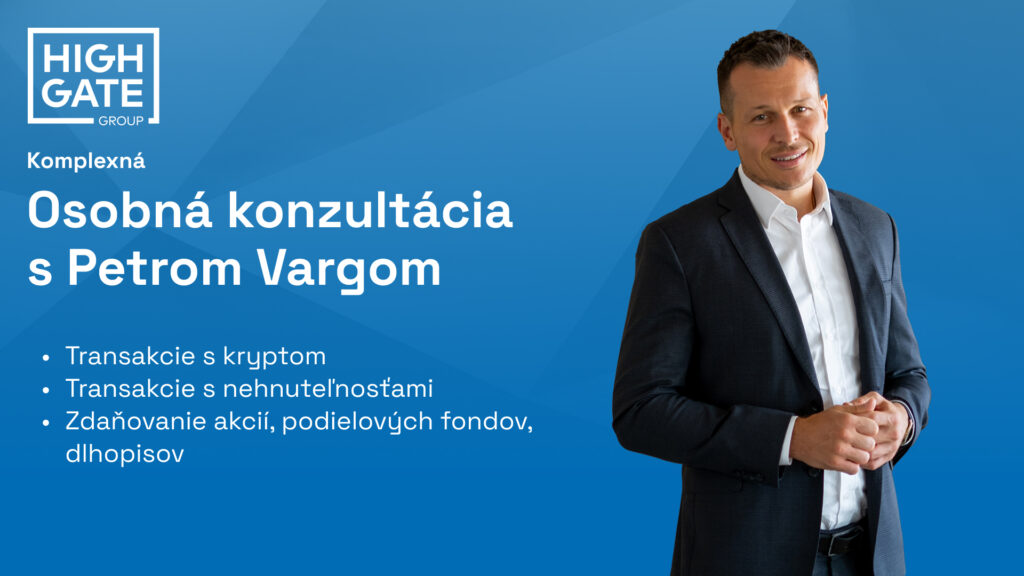
It is currently easier to obtain a license under the Markets in Crypto-Assets Regulation (MiCA) to provide services with cryptoassets in Slovakia than in the Czech Republic. While the Czech authorities are still fine-tuning the implementation of MiCA into the national legislation and the licensing processes are not fully launched, the National Bank of Slovakia (NBS) already offers a clear framework for the registration of crypto service providers. This makes Slovakia a more attractive jurisdiction for exchanges, wallets, digital asset managers and fintech companies looking to operate legally in the single European market.
As we at Highgate Group represent the majority of MiCA licence applications in Slovakia, we will be happy to assist you with securing a MiCA licence and the complete accounting and legal setup of your crypto company, from preparing the documentation to communicating with the regulator.
The Markets in Crypto-Assets Regulation (MiCA) is the first comprehensive European legal framework that regulates the cryptoassets market and business across the European Union. The MiCA aims to establish clear rules for cryptocurrency service providers, enhance investor protection, ensure financial stability, and at the same time foster innovation in digital assets.
MiCA applies to a wide range of entities, from crypto exchanges, wallet providers, payment services, token and stablecoin custodians, to issuers of cryptoassets. Any service provider in this area will have to obtain a MiCA licence, which allows them to operate legally throughout the EU.
The main new obligations introduced by MiCA include:
The MiCA regulation thus brings to the crypto sector similar regulatory standards to those we are familiar with in the traditional financial market. However, it also opens up new opportunities for entrepreneurs, as MiCA licensees can provide their services across the EU without the need for national licenses. At Highgate Group, we assist clients with the full implementation of MiCA requirements. If you are planning to enter the MiCA compliant crypto business, Slovakia is the ideal place to start.
There is a transition for the MiCA regulation in the European Union to ensure a smooth transition from national regimes (e.g. VASP registration) to the new Crypto-Asset Service Provider (CASP) licensing system.
The MiCA Regulation comes into force in two phases:
1. from June 2024: for stablecoins (ART and EMT),
2. from December 2024: for all other cryptoasset service providers (CASPs).
To avoid chaos in the market, the EU has allowed Member States to introduce a “transitional period” during which existing firms can continue to operate under the old rules (e.g. VASP registrations) while preparing for a full MiCA licence.
In the Czech Republic, only VASP registration with the Financial Analytical Office (FAÚ) according to AML Act No. 253/2008 Coll. is currently valid.
The Czech Republic plans to allow a transition period of up to 18 months after the MiCA enters into force, during which existing VASP entities will be able to:
In practice, this means that Czech companies will be able to operate under the old regime until 2026, but they will have to prepare for the new conditions.
In Slovakia, there is also a transition period until the end of 2025. The National Bank of Slovakia (NBS) is therefore trying to help licence applicants by active consulting. This makes Slovakia, in addition to, for example, the requirements for the so-called substance else, a friendly country to operate through the MiCA licence.
If you are already doing business as a VASP (in the Czech Republic or Slovakia), during the transitional period you should:
1. Check if your services fall under the definition of CASP according to MiCA.
2. Start preparing documentation (internal policies, AML/KYC, risk management, protection of client funds).
3. Consult the procedure with our MiCA experts or directly with the supervisory authority (FAU, CNB, NBS).
The cryptocurrency market in the Czech Republic is one of the most developed in Central Europe. Prague has been called the “crypto capital of Europe” for many years, famous projects such as Trezor, General Bytes or Parallel Polis were created here. However, with the growth of this industry comes the need for clearer rules and supervision of crypto service providers.
Currently, crypto service providers in the Czech Republic are regulated by Act No. 253/2008 Coll. on Measures against the Legalization of Proceeds from Criminal Activity (the AML Act). Entities that trade cryptocurrencies, arrange transfers or manage virtual wallets must be registered as a VASP (Virtual Asset Service Provider) with the Financial Analysis Office (FAÚ). However, this registration does not yet constitute a full-fledged licence, rather it is a notification obligation and basic AML/KYC supervision. The requirements are relatively mild and allow smaller entities to enter the market, but do not offer legal certainty for expansion into other EU countries.
Although MiCA has already started to apply in 2024 or 2025, the Czech Republic has not yet implemented a specific procedure to apply for a CASP licence. The Ministry of Finance and the Czech National Bank are still preparing implementing regulations. It is expected that the first licenses will not be available until 2026.
Unlike the Czech Republic, Slovakia has already started to actively implement MiCA. The National Bank of Slovakia (NBS) has launched consultations with companies and prepared a framework for CASP licensing. As a result, firms with Czech capital are increasingly setting up subsidiaries in Slovakia to comply with the new regulation before the process gets underway in the Czech Republic.
Any entity wishing to operate as a CASP (Crypto-Asset Service Provider), such as an exchange, wallet management, or fintech project, will need to obtain a MiCA license.
According to current developments, Slovakia is one of the most prepared countries in the European Union to implement MiCA. The National Bank of Slovakia (NBS) has already prepared a framework and has started accepting preliminary consultations from companies wishing to register as CASPs.
Advantages of Slovakia:
In practice, this means that the process of obtaining a MiCA licence in Slovakia is normally relatively quick and transparent.
With the introduction of MiCA, the European Union is fundamentally changing the way cryptocurrencies and the provision of crypto services are regulated. MiCA creates uniform rules for the entire European market, removing the need for national VASP (Virtual Asset Service Provider) registrations and introducing a new category of providers – CASP (Crypto-Asset Service Provider). However, each EU country is taking a slightly different approach to MiCA implementation. How does the licensing process work in the Czech Republic and Slovakia, and how do these approaches differ.
In the Czech Republic, crypto service providers are currently registered as VASP entities under Act No. 253/2008 Coll. (the so-called AML Act). These companies must be registered with the Financial Analytical Office (FAÚ), which oversees the prevention of money laundering.
The process is relatively simple, just a notification of the business and meeting the basic AML requirements. However, with the MiCA regulation coming into effect, this regime will change. Providers will need to obtain a MiCA licence as a CASP, which means a more detailed assessment:
However, the problem is that the Czech Republic has not yet implemented a full-fledged licensing framework under MiCA. The Financial Analytical Office and the Czech National Bank (CNB) are still preparing detailed procedures, and CASP licence applications cannot yet be officially submitted.
On the contrary, Slovakia is among the first countries in the EU to start the process of implementing MiCA in practice. The National Bank of Slovakia (NBS) has already published basic guidelines for crypto service providers and has started preliminary communication with companies that want to prepare for the licensing procedure.
Currently, entities registered as a VASP with the Financial Intelligence Unit (FIU) can seamlessly transition to the MiCA licensing regime if they meet the requirements for:
In practice, this means that the process of obtaining a MiCA licence in Slovakia can already start to be prepared and consulted with the NBS, which allows companies to gain a significant time advantage over the Czech market. If you are planning to provide cryptoassets services in accordance with MiCA regulation, Slovakia is currently the most suitable country to register and obtain a CASP licence. By obtaining a license in Slovakia, you can legally provide your services throughout the European Union without the need for re-licensing in other member states.
At Highgate Group, we specialize in cryptocurrency regulation, tax and legal advice for crypto businesses.
We can help:
If you are considering entering the regulated crypto market in the EU, Slovakia is currently the fastest and safest route.
However, not all entities and activities are regulated by MiCA. European legislation provides for several exemptions to avoid duplicative regulation or excessive administrative burden for specific cases.
According to Article 2 of the MiCA Regulation, the following situations and entities are not subject to regulation:
MiCA does not apply to digital assets that fall under:
If the token is in the nature of a security, derivative or electronic money, MiCA does not apply to it because it is subject to other, existing regulation.
MiCA does not apply to the European Central Bank (ECB) or to the national central banks of the Member States when acting as public authorities or in the exercise of their official tasks.
The exemption also applies to public authorities, official institutions and international organisations such as the IMF, the World Bank or the European Investment Bank that issue or manage digital assets for public purposes.
MiCA does not apply to cryptoassets used in closed systems such as:
Thus, if a token is not tradable on the public market and does not have an investment function, MiCA does not consider it to be a cryptoasset within the meaning of the regulation.
MiCA does not apply to individuals or small businesses that once-issue a token with no intention of publicly trading it or providing crypto services as a business.
MiCA regulation does not yet cover fully decentralised finance (DeFi) or NFTs (non-fungible tokens) unless these assets are fungible or constitute an investment product. However, the European Commission has already announced that it will be preparing MiCA II, which may cover these areas, once MiCA is launched.
Meanwhile, the National Bank of Slovakia (NBS) confirms that the exemptions in the MiCA will be fully respected in the Slovak implementation. At the same time, however, it warns that incorrect interpretation of the exemptions may lead to unauthorised business without a CASP licence, which may have sanctioning consequences. Therefore, it is important to assess each activity on an individual basis, especially if you are straddling the line between fintech, gaming tokens, NFTs and investment cryptoassets.
If you are interested in this topic, please do not hesitate to contact us:

Law & Tax
Tomas Demo
tomas.demo@highgate.sk
Accounting
Peter Šopinec
peter.sopinec@highgate.sk
Crypto
Peter Varga
peter.varga@highgate.sk